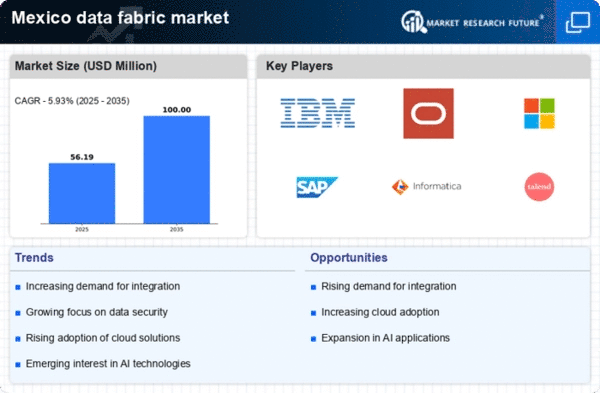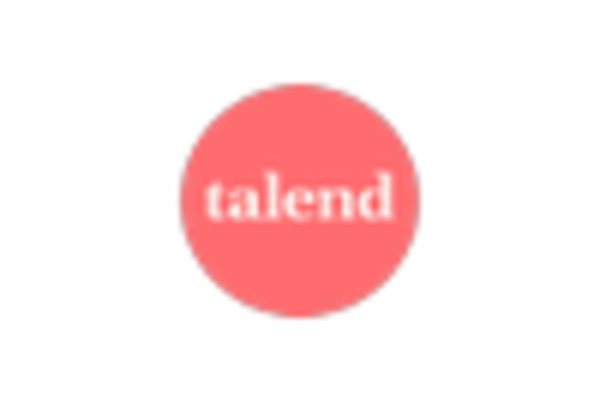Emergence of Hybrid IT Environments
The emergence of hybrid IT environments is reshaping the data fabric market in Mexico. Organizations are increasingly adopting a combination of on-premises and cloud-based solutions to optimize their IT infrastructure. This trend necessitates the integration of diverse data sources and platforms, which data fabric technologies are designed to address. As businesses seek to enhance flexibility and scalability, the demand for solutions that can seamlessly connect and manage data across hybrid environments is likely to grow. It is projected that by 2027, over 50% of Mexican enterprises will operate in hybrid IT environments, further driving the adoption of data fabric solutions. This shift presents opportunities for vendors to offer innovative solutions that cater to the evolving needs of organizations in the data fabric market.
Growing Importance of Data Governance
In the context of the data fabric market, the emphasis on data governance is becoming increasingly pronounced in Mexico. Organizations are recognizing the necessity of establishing robust data governance frameworks to ensure data quality, compliance, and security. This trend is particularly relevant as regulatory requirements continue to evolve, necessitating organizations to adopt comprehensive data management practices. It is estimated that by 2026, over 60% of Mexican enterprises will implement formal data governance policies. Consequently, the demand for data fabric solutions that facilitate effective data governance is likely to rise, as these technologies provide the necessary tools for data lineage, auditing, and compliance management, thereby enhancing the overall integrity of data assets.
Rising Demand for Real-Time Data Processing
The data fabric market in Mexico experiences a notable surge in demand for real-time data processing capabilities. As businesses increasingly rely on timely insights to drive decision-making, the need for efficient data integration and management solutions becomes paramount. This trend is particularly evident in sectors such as finance and retail, where the ability to analyze data in real-time can lead to competitive advantages. According to recent estimates, the market for real-time data processing solutions is projected to grow at a CAGR of approximately 25% over the next five years. Consequently, organizations are investing in data fabric technologies to streamline their operations and enhance their analytical capabilities, thereby propelling the growth of the data fabric market in Mexico.
Expansion of Digital Transformation Initiatives
Digital transformation initiatives are gaining momentum across various industries in Mexico, significantly impacting the data fabric market. Organizations are increasingly adopting digital technologies to improve operational efficiency and customer engagement. This shift necessitates the integration of disparate data sources, which data fabric solutions are well-equipped to handle. As per industry reports, approximately 70% of Mexican companies are expected to prioritize digital transformation in their strategic plans, leading to a heightened demand for data fabric technologies. The ability to create a unified data architecture enables businesses to harness the full potential of their data, thereby driving innovation and enhancing competitiveness in the evolving market landscape.
Increased Investment in Analytics and Business Intelligence
The data fabric market in Mexico is witnessing a significant uptick in investments directed towards analytics and business intelligence (BI) solutions. As organizations strive to leverage data for strategic decision-making, the integration of advanced analytics capabilities becomes essential. Recent surveys indicate that approximately 55% of Mexican businesses plan to increase their spending on analytics tools in the coming years. This trend underscores the necessity for data fabric technologies that can seamlessly integrate and manage data from various sources, enabling organizations to derive actionable insights. By facilitating a cohesive data environment, data fabric solutions empower businesses to enhance their analytical capabilities, thereby driving growth and innovation in the competitive landscape.
















